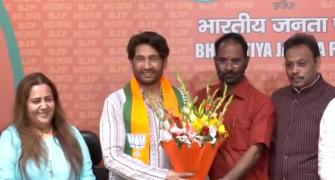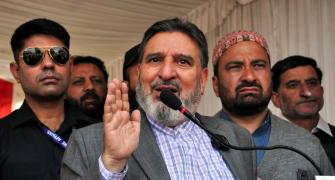The Central Information Commission that has blazed a new trail in ensuring transparency in governance favours greater financial and administrative autonomy so that it is not dependent on the government for its functioning.
However, the apex body itself is not clamouring for an amendment of the Right To Information Act to vest itself with more powers since it would like to test the limits of the existing law before doing that.
"What is really required is administrative and financial autonomy. At present, we are totally dependent upon the government both for administrative structure and for our finances," Chief Information Commissioner Wajahat Habibullah said.
He said Parliament should make a direct grant to the commission instead of routing fund allocation through the Department of Personnel and Training.
Stating that the commission, being a quasi-judicial body, cannot function like any other government department which has deputy secretaries and joint secretaries, he said, "What we need is court masters and people with a judicial background."
Habibullah also made a case for freedom to recruit staff as opposed to the current practice of deputing personnel to the commission from the government. "For this, first we will have to frame our own recruitment rules," he said.
"We have placed a restructured proposal," he said, adding the finance ministry was favourably disposed towards it. On amending the RTI law, Habibullah said he did not favour more teeth for the commission as the RTI Act was still to be tested for all its limits.
To a question on changing the law to provide for a contempt clause to deal with officials who fail to comply with the commission's decisions, he said that in his view, it was not necessary at the moment.
Acknowledging that such powers would make the implementation of the commission's orders easier, Habibullah said, "We must not necessarily seek the easiest way out because the RTI Act (in its present form) has a great deal of potential."
He said the general consensus among information commissioners from other states was to add contempt provisions to the RTI Act so as to deal with the problems of non-compliance of orders by the public information officers.
The information commissioners at a conference last month recommended that contempt provisions should be included in the RTI Act to ensure greater enforcement of the orders. The recommendations will be examined by a Parliamentary standing committee.
Habibullah further pointed out, "The RTI Act is potentially a very powerful legislation. We are probably the most advanced in the whole world in terms of the act, but not necessarily in terms of its implementation".
Replying to a question on bureaucratic resistance to part with information, he said, "Contrary to the common impression within the bureaucracy, there are a lot of people who have welcomed the act; many have said it gives them a better way of monitoring their own departments."
The CIC chief said he backed extending the RTI's purview to include inquiry into judicial misconducts as proposed under the Judges (Inquiry) Bill 2006. "I don't see why the judiciary should be treated differently," he said.
To a question on institutions not covered under the RTI Act, Habibullah said the Cabinet Secretariat was mulling changes in the list of exempted organisations, as the list appeared to have been made hurriedly.
Reading out names of organisations from the list, termed as schedule II under the RTI Act, he said some of those seemed to have been wrongfully granted exemption under the Act.
Asked if the commission had suggested changes in the list, he said, "We cannot seek any changes. It is for the government to do that and the government has sought the changes. The commission has no role to play in this at all nor is our view taken as to which organisation is to be included or not".
While the list of organisations excluded from the purview of the RTI Act includes Intelligence Bureau and Research and Analysis Wing (RAW) among others, the central investigative agency, the Central Bureau of Investigation, is also known to have sought exemptions under the Act, as stated in the commission's first annual report.
Asked about opposition among officials to share file notings with RTI applicants, Habibullah said that access to file notings was essential for the success of the legislation. "File notings are no longer an issue and they are very much a part of the RTI Act," he clarified.
"We have held that file notings are a part of the RTI Act and that it is being divulged repeatedly and it has not destabilised the government. I think apprehensions that it would have such an effect could be laid to rest," the commissioner said.
While denying any resistance in the government circles on the subject, with the DoPT yet to remove from its web site that file notings are not covered under the RTI Act, Habibullah said he has asked the department to comply with the commission's recommendations on the matter.
Exuding confidence over the evolvement of the two-year-old transparency legislation, he said the government was positive on his proposal to integrate the RTI network with the country's ambitious e-governance programme. "Once that is done, RTI applications could be filed online," he said.
Habibullah stressed: "To optimise gains from the RTI law, all records need to be computerised, otherwise the government machinery will not be able to withstand the demands that the RTI Act is going to raise."
He underscored the need for effectively implementing provisions of proactive disclosure by public authorities. The provisions on voluntary disclosures, as required under section 4 of the transparency law, call upon public authorities to disclose information on their own.
On a question on the outcomes of the legislation so far, he said a recent report by global watchdog Transparency International said the country's position in corruption rankings had improved.







